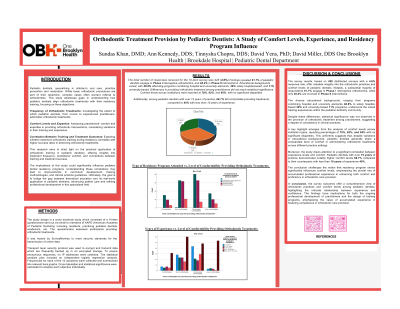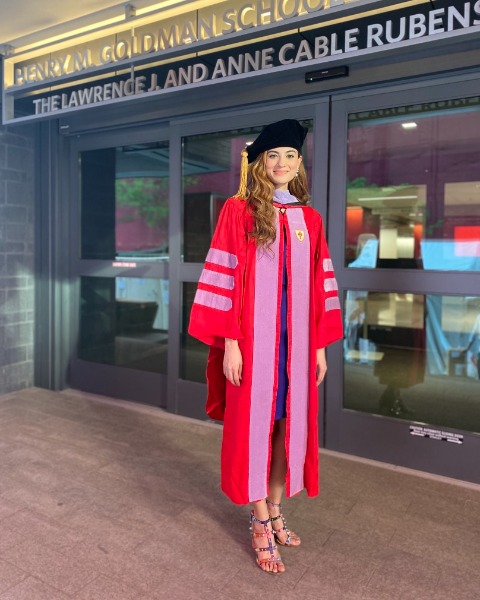Back

Orthodontics
261 - Examining Pediatric Dentists Comfort Levels in Orthodontic Treatment Administration
Friday, May 24, 2024
2:00 PM – 2:10 PM EST
Location: Exhibit Hall (back left corner of the hall, space 137)


Sundas Khan, DMD (she/her/hers)
Dental Resident
One Brooklyn Health
One Brooklyn Health
West Harrison, New York, United States- TC
Tinnysha Chopra, DDS
Program Director
One Brooklyn Health
Brooklyn, New York, United States
Presenting Author(s)
Program Director(s)
Abstract:
Purpose: This research assesses the comfort levels of pediatric dentists administering orthodontic treatments, exploring correlations with experience and residency programs.
Methods: A cross-sectional study emailed a 10-item survey to 9000 American Academy of Pediatric Dentistry members, investigating the impact of experience and residency on comfort levels.
Results: Among 428 distributed surveys, 4.6% were returned. Findings revealed 61.7% of pediatric dentists engage in Phase I interceptive orthodontics, and 34.6% in Phase II. Educational backgrounds varied, with 48.8% attending programs combining hospital and university elements, 39% solely hospital-based, and 11% university-based. Differences in providing orthodontic treatment among practitioners did not reach statistical significance. Comfort levels across institutions were reported at 70%, 62%, and 65%, with no significant disparities.Additionally, among pediatric dentists with over 15 years of practice, 68.7% felt comfortable providing treatments, compared to 45% with less than 10 years of experience.
Conclusions: Residency program choice doesn't significantly influence pediatric dentists' comfort levels during orthodontic treatment administration. Significantly, professionals with more than 15 years of experience exhibit increased confidence in delivering both phase I and II of interceptive orthodontics surpassing those with less than 10 years. This highlights the potential positive impact of accumulated professional experience on both comfort and proficiency in orthodontic care provision.
Purpose: This research assesses the comfort levels of pediatric dentists administering orthodontic treatments, exploring correlations with experience and residency programs.
Methods: A cross-sectional study emailed a 10-item survey to 9000 American Academy of Pediatric Dentistry members, investigating the impact of experience and residency on comfort levels.
Results: Among 428 distributed surveys, 4.6% were returned. Findings revealed 61.7% of pediatric dentists engage in Phase I interceptive orthodontics, and 34.6% in Phase II. Educational backgrounds varied, with 48.8% attending programs combining hospital and university elements, 39% solely hospital-based, and 11% university-based. Differences in providing orthodontic treatment among practitioners did not reach statistical significance. Comfort levels across institutions were reported at 70%, 62%, and 65%, with no significant disparities.Additionally, among pediatric dentists with over 15 years of practice, 68.7% felt comfortable providing treatments, compared to 45% with less than 10 years of experience.
Conclusions: Residency program choice doesn't significantly influence pediatric dentists' comfort levels during orthodontic treatment administration. Significantly, professionals with more than 15 years of experience exhibit increased confidence in delivering both phase I and II of interceptive orthodontics surpassing those with less than 10 years. This highlights the potential positive impact of accumulated professional experience on both comfort and proficiency in orthodontic care provision.

.jpg)